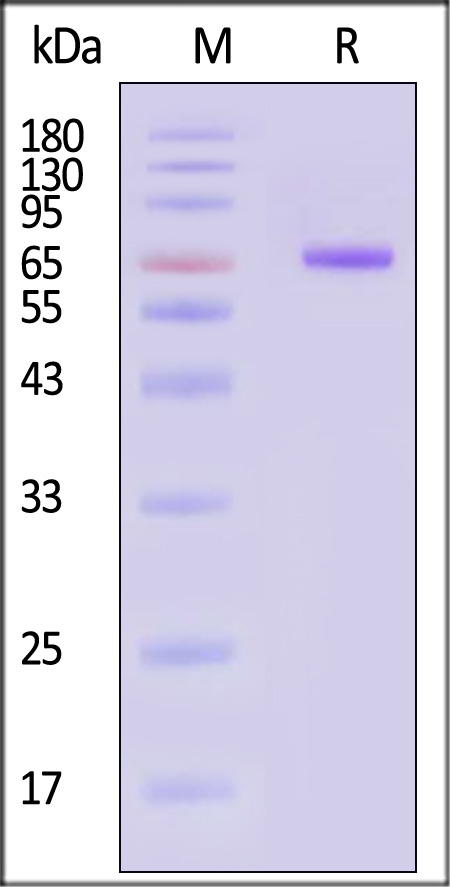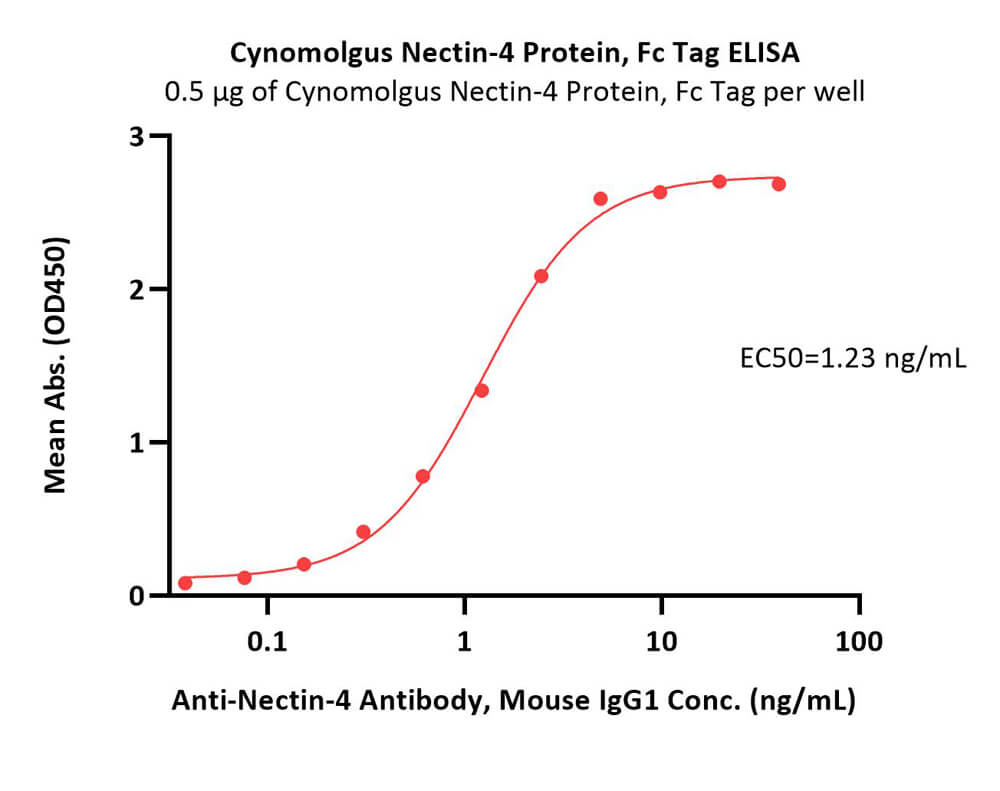分子别名(Synonym)
NECTIN4,LNIR, PRR4, PVRL4
表达区间及表达系统(Source)
Cynomolgus Nectin-4 Protein, Fc Tag (NE4-C5253) is expressed from human 293 cells (HEK293). It contains AA Gly 32 - Ser 349 (Accession # XP_005541277.1).
Predicted N-terminus: Gly 32
Request for sequence
蛋白结构(Molecular Characterization)

This protein carries a human IgG1 Fc tag at the C-terminus
The protein has a calculated MW of 60.5 kDa. The protein migrates as 65-70 kDa when calibrated against Star Ribbon Pre-stained Protein Marker under reducing (R) condition (SDS-PAGE) due to glycosylation.
内毒素(Endotoxin)
Less than 1.0 EU per μg by the LAL method.
纯度(Purity)
>90% as determined by SDS-PAGE.
制剂(Formulation)
Lyophilized from 0.22 μm filtered solution in 50 mM Tris, 100 mM Glycine, 25 mM Arginine, 150 mM NaCl, pH7.5 with trehalose as protectant.
Contact us for customized product form or formulation.
重构方法(Reconstitution)
Please see Certificate of Analysis for specific instructions.
For best performance, we strongly recommend you to follow the reconstitution protocol provided in the CoA.
存储(Storage)
For long term storage, the product should be stored at lyophilized state at -20°C or lower.
Please avoid repeated freeze-thaw cycles.
This product is stable after storage at:
- -20°C to -70°C for 12 months in lyophilized state;
- -70°C for 3 months under sterile conditions after reconstitution.
质量管理控制体系(QMS)
电泳(SDS-PAGE)

Cynomolgus Nectin-4 Protein, Fc Tag on SDS-PAGE under reducing (R) condition. The gel was stained with Coomassie Blue. The purity of the protein is greater than 90% (With Star Ribbon Pre-stained Protein Marker).
SEC-MALS

The purity of Cynomolgus Nectin-4 Protein, Fc Tag (Cat. No. NE4-C5253) is more than 85% and the molecular weight of this protein is around 110-140 kDa verified by SEC-MALS.
Report
活性(Bioactivity)-ELISA

Immobilized Cynomolgus Nectin-4 Protein, Fc Tag (Cat. No. NE4-C5253) at 5 μg/mL (100 μL/well) can bind Anti-Nectin-4 Antibody, Mouse IgG1 with a linear range of 0.1-2 ng/mL (QC tested).
Protocol
背景(Background)
Nectin-4(Nectin cell adhesion molecule 4) is a Nectin and nectin-like family of cell adhesion molecules. It is found in high levels in normal embryonic and fetal tissues, but decreases after adulthood and is limited in distribution in healthy tissues. Nectin-4 is overexpressed in a variety of tumor cells and promotes tumor cell growth and proliferation. Solid tumors with high expression of Nectin-4 include bladder cancer, pancreatic cancer, triple negative breast cancer, non-small cell lung cancer, stomach cancer, esophageal cancer, ovarian cancer and many other cancers. Studies have found that Nectin-4 promotes tumor cell proliferation, differentiation, migration and invasion by activating the PI3K/Akt pathway, and is believed to play an important role in the occurrence and metastasis of cancer. It is based on these research backgrounds that drug research targeting this target has emerged.























































 膜杰作
膜杰作 Star Staining
Star Staining










 Loading ...
Loading ...




